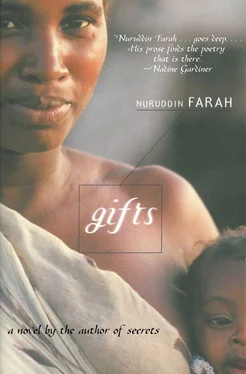Nuruddin Farah - Gifts
Здесь есть возможность читать онлайн «Nuruddin Farah - Gifts» весь текст электронной книги совершенно бесплатно (целиком полную версию без сокращений). В некоторых случаях можно слушать аудио, скачать через торрент в формате fb2 и присутствует краткое содержание. Год выпуска: 2011, Издательство: Arcade Publishing, Жанр: Современная проза, на английском языке. Описание произведения, (предисловие) а так же отзывы посетителей доступны на портале библиотеки ЛибКат.
- Название:Gifts
- Автор:
- Издательство:Arcade Publishing
- Жанр:
- Год:2011
- ISBN:нет данных
- Рейтинг книги:3 / 5. Голосов: 1
-
Избранное:Добавить в избранное
- Отзывы:
-
Ваша оценка:
- 60
- 1
- 2
- 3
- 4
- 5
Gifts: краткое содержание, описание и аннотация
Предлагаем к чтению аннотацию, описание, краткое содержание или предисловие (зависит от того, что написал сам автор книги «Gifts»). Если вы не нашли необходимую информацию о книге — напишите в комментариях, мы постараемся отыскать её.
Gifts — читать онлайн бесплатно полную книгу (весь текст) целиком
Ниже представлен текст книги, разбитый по страницам. Система сохранения места последней прочитанной страницы, позволяет с удобством читать онлайн бесплатно книгу «Gifts», без необходимости каждый раз заново искать на чём Вы остановились. Поставьте закладку, и сможете в любой момент перейти на страницу, на которой закончили чтение.
Интервал:
Закладка:
Meanwhile, Nasiiba was formidably excited, her speeches a mixture of half-understood and fully-comprehended ideas, throwing freely into the air a wonderous set of words meaning nothing to her. There was a sub-pattern in her language, something earnest and humourless too, like a mother readying her daughter for a children’s party given in the house of an in-law with whom the woman is uncomfortable. It was an effort for Duniya to stand naked and still.
Nasiiba was saying, “You will wear your hair up, in a crown of a bun. But first well comb it, and before doing so, well apply some sort of brilliantine-conditioner. A very upright bun will suit you fine. And no head-dress.”
“May I put on something in the meantime?”
“In a moment, no need to panic.”
Duniya reached for a headscarf, with which she covered her embarrassment in the attitude of an Eve hiding herself with Freudian fig-leaves. Her face was undeniably that of a humiliated person, but she remained silent, although not still.
“Here is an underbodice, a pair of underpants and a brassiere,” Nasiiba said to her mother. “Now put these on and no fuss pleased.” The young woman might have been a mother giving two stop-gap mouthfuls to a child crying for food.
“I should never have asked you to help me dress,” regretted Duniya.
To this Nasiiba retorted, “Parents seldom remember the million embarrassing moments their children live through, being dressed in clothes they would rather not wear, being fed on food they would rather not eat, being washed when they would be all too delighted to remain dirty, their private parts being fingered, mutilated, massaged. Not only have you done these and worse to me, but do you realize, Mother dear, that as a Somali mother and a Muslim one at that, you have the legal, parental right to check if I am virgin.”
Having put on the underpants, the brassiere and the underbodice Duniya asked, “What would you like me to do now?”
Nasiiba grabbed a straight-backed chair and placed it in such a way Duniya would face east, where the light was better. Then she walked back and took a good hold of her mother’s hand, and her mother followed her, timid like a bride entering her new home. “Sit and stay still and don’t say a word,” Nasiiba commanded.
Duniya did not like it when someone else held sway over her, she hated the feeling of powerlessness, of not knowing what was being done to her. “The reason why I rebel against the authority of men,” she once said to a friend, “is that they tend to make decisions affecting women’s lives at meetings at which women are not present.” Was Duniya now seeing Nasiiba as “male”? Had she not stripped her, as men had, had she not rendered her powerless as men had? “What are you doing to me, Nasiiba?” she asked.
“Have faith in me,” was all Nasiiba was willing to say.
She began twisting and turning plaits of hair on Duniya’s crown. Both were relaxed enough; Nasiiba was the more pleased with the outcome of her artistic effort, though Duniya was less tense, her body less rigid. As if this displeased her, she went out of her way to say, “Incidentally, Nasiiba, did I see wads of money tacked and hidden away in an Iranian Islamic women’s magazine called Mahjouba?”
Duniya might have been a pet cat, well-fed and pampered, which had brought into one’s living-room the corpse of a dead lizard when one had guests. “I won’t stand for this nonsense,” Nasiiba raged, having in anger thrown the comb which, in somersaults of fury hit the furthest wall in the courtyard. “What were you doing rummaging in my drawers, through my private things?” All combing, plaiting and bun-shaping came to a sudden stop. Nasiiba was livid.
“I believed I had misplaced something.”
“I hate you sometimes,” said Nasiiba.
“No, you don’t,” Duniya said.
Like someone appreciating an artwork, Nasiiba took a couple of steps backwards. She placed her hands on her hips in a defiant gesture and said, her voice mimicking her mother’s, “By any chance, did I see Fariida at the clinic today? Or: in aid of what did you donate blood, Nasiiba? And now what?” And then, in her normal voice, “What were you doing rummaging in my things?”
“At times I wonder if it’s your place or mine to lose tempers? Now come,” Duniya said, “don’t let’s waste more time, for the truth is I suspect I know where the money came from. Come and finish what you’ve started, and be quick.” Duniya was very firm.
Before long, and without so much as a word, Nasiiba resumed building a castle of a bun. And neither talked until Nasiiba said she was done. And when she saw discomfort on her mother’s face, the young woman brought out a mirror for Duniya to take a look.
Duniya said, “I’ve never worn my hair uncovered, since my seventeenth year, Nasiiba.”
“You’re modern-looking when it is uncovered,” suggested her daughter.
“And it sticks out like the red of a semaphore in an otherwise darkened street and the whole world can see it from a mile away.”
“You will get used to it, and Bosaaso will love you all the more for it,” ventured Nasiiba.
At the mention of Bosaaso’s name Duniya relaxed.
Meanwhile, Nasiiba’s tone of voice had lost its distinctiveness. She was saying, “Your face needs a touch of make-up, a thin coat, that is all.” And she was coming menacingly in Duniya’s direction, carrying a variety of brushes and bottles.
“No make-up for me, thank you.”
A moment later Nasiiba was back, carrying a pair of ear-rings. “Whose are these?” wondered Duniya suspiciously.
“They are yours actually, given to you by Uncle Abshir.”
Duniya nodded her head, acknowledging the truth of the statement.
“If you believe that your ears stick out like the flagposts of a football stadium, perhaps this pair of ear-rings will correct that.” They were very pretty, a circular shape with a five-cornered star fitted into the frame, and painted blue.
By the time they heard Bosaaso’s car-horn announcing his arrival, Duniya had the chance to give her head a few touches here and there, and was feeling comfortable in the dress she had chosen and which Nasiiba had approved. It was just as she was joining Bosaaso who remained in the car that Duniya said to Nasiiba, “Please give my condolences to Fariida, who I understand is the foundling’s mother, and tell her to come and visit us whenever she feels like it.” And Duniya left the house in haste, eager not to be interrogated by her daughter.
And we went to a restaurant.
The moment the waiter who came to take their order left them alone in the half-dark, they kissed, with only a paraffin-lamp providing a semblance of light. The desire to kiss had caught them unprepared, with the suddenness of a hay-fever sneeze: it was brain-clearing. They embraced a long time, their breath merging, and each had what it took to make the other comfortable and vulnerable.
Silent, not kissing, they now sat on a straw-mat on the ground, under a thorny tent of acacia bushes, a paraffin-lamp hanging down from a branch in the tree, its light not interfering with their privacy. Any Mogadiscian wanting undisturbed quiet, or in search of the city’s best lamb and rice, indeed any resident of Mogadiscio desiring to taste the romanticized image of untamed jungles: such people came here, men and women in love, foreigners in need of local colour or visitors seeking meal-souvenirs to remind them of Somalia. Needless to say, these entrepreneurial kitchens attracted Mogadiscio’s local motorists and for a very good reason.
The waiters carried lanterns, adhering strictly to codes of behaviour guaranteeing absolute privacy to the clients patronizing the establishment. They moved quietly, they cleared their throats or coughed as they approached a tree-tent in which a couple nestled intimately against one another or in each other’s embrace.
Читать дальшеИнтервал:
Закладка:
Похожие книги на «Gifts»
Представляем Вашему вниманию похожие книги на «Gifts» списком для выбора. Мы отобрали схожую по названию и смыслу литературу в надежде предоставить читателям больше вариантов отыскать новые, интересные, ещё непрочитанные произведения.
Обсуждение, отзывы о книге «Gifts» и просто собственные мнения читателей. Оставьте ваши комментарии, напишите, что Вы думаете о произведении, его смысле или главных героях. Укажите что конкретно понравилось, а что нет, и почему Вы так считаете.











